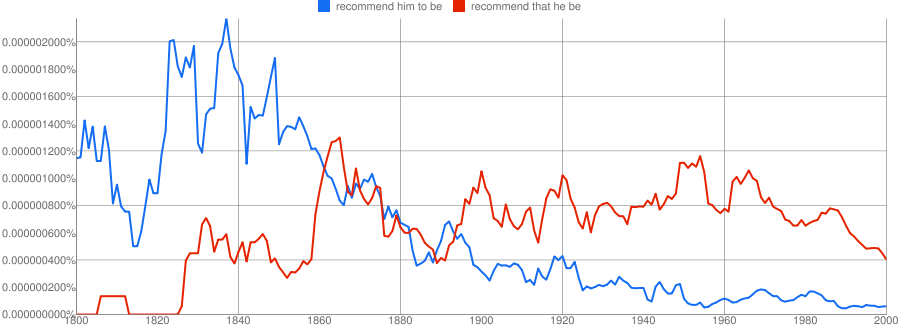I'd like to ask about the use of the verb "recommend" in the following sentences:
We'd recommend you to book your flight early.
The plumber recommended me to buy a new water heater.
The first sentence is taken from the entry for the verb "recommend" in the online Oxford Advanced Learner's Dictionary and the other is from a grammar site. I'm still unsure if the usage "recommend someone" instead of "recommend to someone" is widely acceptable. While the first sentence seems have only one possible interpretation: "recommended to you", the other one, although less likely, could also be interpreted like: "The plumber recommended me, not someone else, to buy a new water heater".
My question is whether it is possible to reinterpret the given examples as:
We'd recommend that you book your flight early.
The plumber recommended that I buy a new water heater.
meaning that the interpretation is not that "you" or "me" are the objects of "recommend" but the whole proposition following it: "you to book your flight early" and "me to buy a new water heater", same as "that" clauses are in the rephrased examples?
Edit: Thanks to all the contributors for the help!
The meaning of the rephrases of the examples with "that" clause that I gave do tell essentially the same, but I was looking for the nuance in the interpretation of:
We'd recommend you to book your flight early
by comparing it with "that" clause rephrase:
We recommend that you book your flight early.
The salient reading of the first sentence for me would be : We'd recommend to you..and here is what we recommend.., meaning that there's a prosodic pause between "We'd recommend to you.." and the content of the recommendation which is "to book your flight early", while the second sentence I'd read as "We recommend..and here is what we recommend", which is "that you book your flight early", meaning that now the person who is recommended something is part of the content of the recommendation. In other words, this person doesn't stand prominently as the explicit object of the recommendation as it does in the former sentence.
In brief, I was thinking that sentence 1 above may be interpreted as 2 too, not only as "recommend to you". When I use "for" in between the verb "recommend" and the person recommended this is more clearly shown:
I'd recommend for you to book your flight early.
Here again I'd read the sentence as "I'd recommend..and here is what I recommend". The person recommended is part of the whole proposition recommended — "for you to book your flight early", same as with "that-clause" phrasing, and it is not a clear object of the verb "recommend" as it is in "recommend to you" interpretation . By the way,I'd like to know how acceptable "recommend for someone to do something" construction is to you, as I haven't found it noted in Oxford ALD.
To clarify my question, I'd like to add that in the original sentences "recommend" takes "to-infinitival" complement, not a bare verb which would be understood as a "that"-clause with "that" elided: "recommend you book your flight early", would stand for "recommend that you book your flight early". Again, my question is if "that-clause" complement, (nevermind if "that" is elided or not) is comparable with "you to book your flight early" or "for you to book your flight early" in the given sentence.
Finally, as native speakers you're entitled to question any dictionary or book as it is up to you to decide what works and what not, there's no single ultimate authority for the language people speak, so you can argue even with Oxford guys. "Grammatical" is what is acceptable to the majority of the speakers.

